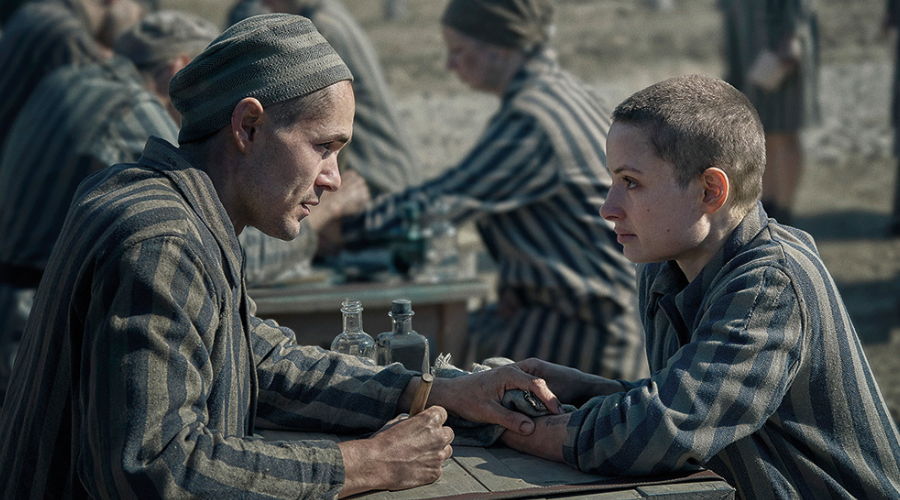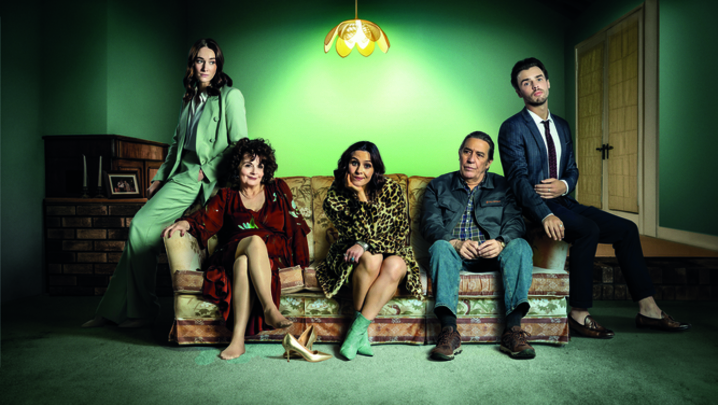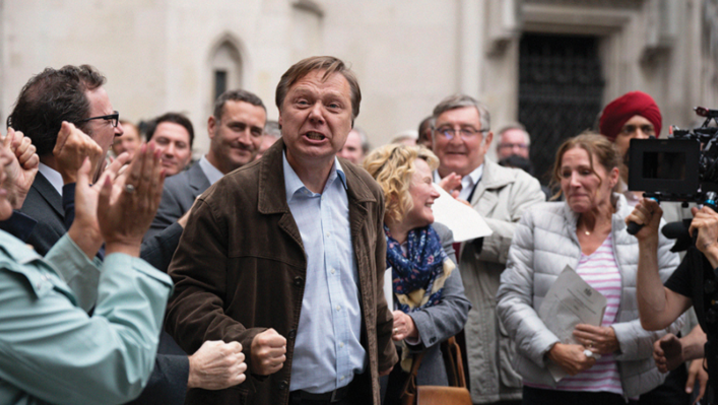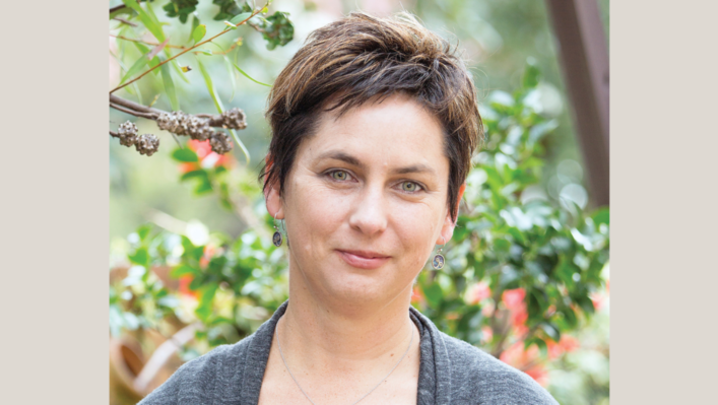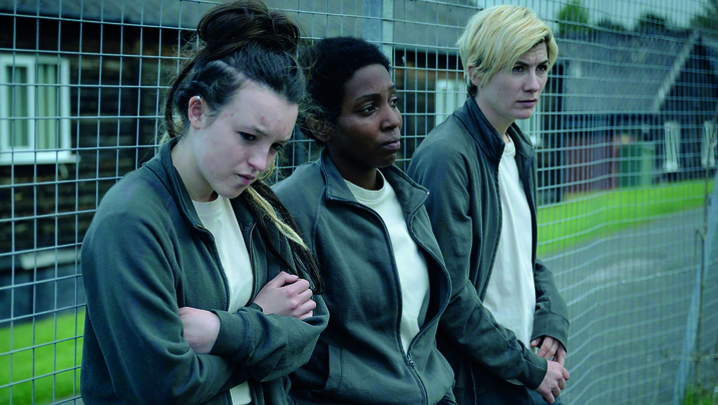Adapting The Tattooist of Auschwitz for TV proved challenging for all concerned, the RTS discovers
“This is a love story,” says protagonist Lali Sokolov in a scene when he begins to tell writer Heather Morris about his time in Auschwitz, the Nazi concentration camp and extermination centre where he met his future wife, Gita Furman.
Their unlikely romance distinguishes The Tattooist of Auschwitz, based on Morris’s best-selling novel, itself based on real events, from other recent films inspired by the Holocaust. These are Oscar-winner Jonathan Glazer’s The Zone of Interest, also set in Auschwitz, and One Life, about Nicholas Winton, who helped Jewish children flee from Nazi-occupied Czechoslovakia shortly before the Second World War.
At an RTS screening and Q&A in central London, director Tali Shalom-Ezer (Princess, My Days of Mercy) told the host, film critic Jason Solomons, that the team was apprehensive about introducing a joyful element to such a harrowing situation. But “the real Lali and Gita showed bravery by refusing to be dehumanised, so we tried to be brave about portraying their gentle and intimate connection within this context,” she said.
The Tattooist of Auschwitz is a six-part series for Sky in the UK (where it is being shown on Sky Atlantic and Now), and Peacock in the US.
It has been produced in association with Sky Studios by Synchronicity Films (The Cry, Only You), which bought the TV rights to the book shortly after its publication in 2018.
The book has sold more than 12 million copies. Its popularity provides a much-needed reminder of the Holocaust at this critical time, Synchronicity’s Claire Mundell told the RTS audience. “When we were looking at optioning the book, my research showed that there was almost no awareness of Auschwitz and the Holocaust among young people, particularly in the UK and the US.
“Yet, here was this book that people were reading and buying and sharing – people who wouldn’t usually be drawn to a book about the Holocaust. Hopefully, through the medium of mainstream drama, we can take this story to a wider audience.”
Using the same dramatic technique as One Life, Sokolov’s story is told in two timelines. One takes place in Melbourne in 2003, when an older Sokolov (played by the acting legend Harvey Kietel) recounts his memories to Morris (Yellowjackets’ Melanie Lynskey). The other timeline is during the Second World War, when the young Sokolov (Jonah Hauer-King) is sent to Auschwitz and is assigned the job of tattooing his fellow captives with their identification numbers. When he meets new inmate Gita (Anna Próchniak), he instantly falls in love.
“Jacquelin Perske, our head writer and fellow executive producer, was inspired by the foreword in the book, where Heather Morris speaks very clearly about her memories of meeting Lali for the first time,” said Mundell. “That provided a door through which we could tell the story in two timeframes. It also enables the audience to have an access point: Heather is the everywoman.”
The narrative switches poignantly between the two timelines. Dialogue in the Auschwitz timeline points to a modern-day unreliable narrator who is telling a slightly skewed version of events. In Melbourne, Sokolov is haunted by the figures of the past who appear as if ghosts, revealing darker memories than those he shares with Morris.
“That is a conscious choice to try to express the nature of trauma, memory and shame – because, ultimately, he was carrying misplaced shame as an 86-year-old man,” said Mundell.
The responsibility of telling this important story weighed on the cast and creatives. Once the creative team was assembled, Synchronicity arranged for a visit to Auschwitz to learn more about its horrors. Historical and cultural consultant Naomi Gryn came on board to ensure the series was historically accurate.
But screen stories that attempt to convey the horror of the Holocaust can only tell us so much, Mundell told the RTS: “It’s a television drama, so we can never truly portray what happened there. All we can do is provide a platform for people to be moved, engaged and, hopefully, motivated to find out more.”
Filmed on the outskirts of Bratislava in a recreated Auschwitz, the production was smooth-running thanks to director Shalom-Ezer’s clear vision, said Lynskey: “She’s like a surgeon. Her notes are so precise and so specific, you can’t not take them. The next take would be what she wanted because her notes are that good.”
Hans Zimmer, whose credits include Dune and Gladiator, co-wrote the score. Unusually, he approached Synchronicity rather than the other way round. An amused Mundell said: “After he’d done an incredible pitch, he said, ‘Guys, let’s be straight here, I really want this show. Can you please trust us to do the music for it?’ I was like: ‘I’ll think about it and call you tomorrow.’”
Zimmer and two of his colleagues at Bleeding Fingers Music, Kara Talve and Russell Emanuel, created a soundtrack to match the onscreen emotional rollercoaster. “As the series develops, it just grows and it’s incredible,” said Mundell. “In every episode, there’s a different take on the themes and there are some amazing musical surprises coming up.”
For the lead Auschwitz actors – Próchniak, Hauer-King and Jonas Nay, who portrays Stefan Baretzki, an SS guard – the responsibility of playing these parts weighed heavily.
Hauer-King explained the effect of shaving his head: “I was naive about it. I thought shaving my head would be the easy part of getting into character. But, because it’s about taking someone’s identity and dehumanising them, it was poignant,” he said.
The transformation was particularly difficult for German-born Nay as he put on his SS uniform every day. It “was a weight I sometimes couldn’t bear. It was horrible. The physical reaction was panic.”
He was the only SS guard in a scene full of cold, shivering extras wearing prison uniforms, among them a painfully thin Hauer-King. “Sometimes it was hard for me to get out of the state of panic and to get into acting,” said Nay. “But we all felt a responsibility to tell the story that Lali would have wanted us to tell. Playing SS guard Stefan Baretzki was a necessary part of that.”
Próchniak, who had to lose weight for the role, felt the added pressure of playing a character based on a real person. “It’s very scary, exposing, terrifying for an actor,” she said. “I used to be a dancer, and I believe that our bodies are much smarter than our minds. I cannot imagine what she’s been through, so believing that we can connect to emotions through our bodies was a starting point for me.”
Solomons’ final questions concerned how the show had altered the panellists’ view of love. Shalom-Ezer answered unequivocally: “I believe in love. You will have to watch all the episodes and then tell me if you believe in it or not, but it was certainly my goal to make people believe in love.”
‘Screening and Q&A with the team behind Sky Original The Tattooist of Auschwitz’ was an RTS National Event held on 10 April. The Tattooist of Auschwitz launched on Sky Atlantic and Now on 2 May.

